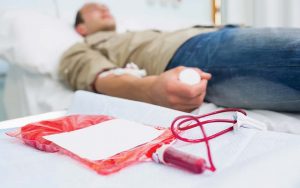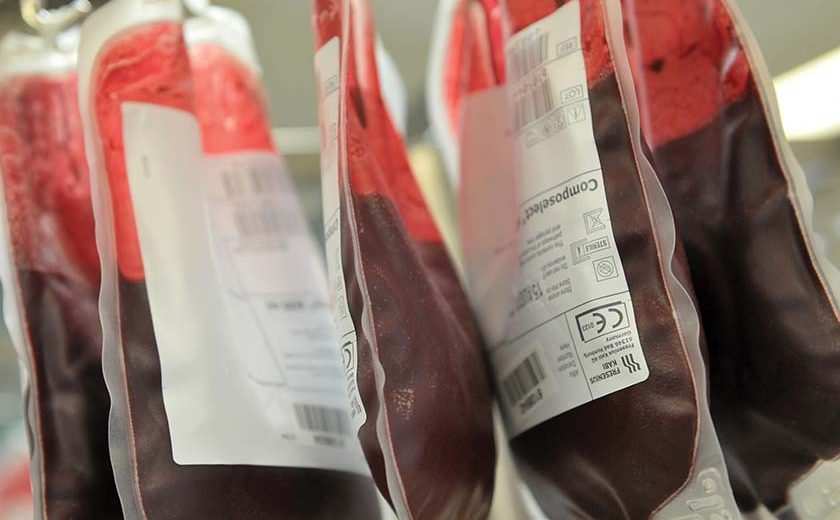Blood donation is giving some of our blood so that it can be used by someone who is in dire need of it.
 Abraham Mathew Saji
Abraham Mathew Saji
Pharmacist
Donated blood helps people who had lost a considerable amount of their blood in an accident or who have illnesses like cancer, anemia, sickle cell disease, or hemophilia, or even those who are undergoing surgery for replacement of lost blood. Donated blood includes red blood cells and the other constituents that make up the blood, such as platelets and plasma. Blood that contains all the parts is called whole blood.
Types of Blood Donation
Blood can be donated either as whole blood, or by their constituents which is called apheresis.
Whole Blood Donation is more common wherein the donated blood will then be processed in the laboratory into its individual components namely plasma, platelet concentrates and packed red blood cells. The volume of whole blood collected depends on the donor’s body weight. A maximum of 450 ml of whole blood is collected from a donor who weighs more than 50 kg. For those with body weight between 45 and 50 kg, the amount of whole blood collected is 350 ml. The whole donation process would take approximately 30 minutes to complete and a whole blood donor may donate as frequent as every three months.
Apheresis donation is donating either plasma or platelets or both, using a plasma or platelet separator machine, also known as an apheresis machine. Time taken to complete an apheresis donation is between 30 to 45 minutes for plasmapheresis and between 45 to 75 minutes for plateletpheresis. Since the red cells are not collected in apheresis donation, a donor may donate more frequently, which is every two weeks, compared to the whole blood donation.
To ensure blood transfusion is safe, the Ministry of Health has directed all healthcare facilities that conduct blood donation to assess prospective donors using a well-structured questionnaire to determine his or her suitability to donate blood. This is to provide an opportunity to defer individuals with high risk of having infections that can be transmitted through blood, thus ensuring the safety of blood supply. Blood and blood products that have tested for HIV and/or other infections are discarded and are not used for transfusion
Qualification Criteria for Whole Blood and Apheresis Donor
Before a person is allowed to donate his or her blood, he or she needs to fulfill few basic criteria like:
Whole Blood Donor
- Aged between 18 and 60 years old (for those less than 18, written consent from parents or legal guardian is required)
- Body weight of at least 45 kg.
- In good physical and mental health with no chronic medical illness.
- Not on long term medications and has not been intoxicated by alcohol within 24 hours prior to donation.
- Should not be fasting and have had enough sleep (more than 5 hours) the night before donating.
- Has been staying in Malaysia for at least 1 year (for non-citizen).
For apheresis donors, aside from the criteria above, there are few additional criteria they have to fulfill:
- Aged not more than 55 years old
- Body weight of more than 55 kg.
- Have donated whole blood at least twice before and the last donation was not more than 6 months ago.
- Having a suitable venous access (firm, large and palpable vein)
- A person’s suitability to donate will be determined by the Medical Officer or the nurse on duty.
- A potential donor has to be in a good state of health so that the donation itself would not bring harm to the donor and also the donated blood would not harm the patient who would be transfused with the blood.
Additionally:
- Females are not allowed to donate blood if they are menstruating, pregnant, breastfeeding, or experienced a miscarriage 6 months prior to the donation.
- Anyone who have ever lived in the United Kingdom (England, Northern Ireland, Scotland, Wales, Isle of Man or the Channel Islands) or the Republic of Ireland from 1980-1996 for a period of 6 months or more, or have lived in Europe from 1980 to present for 6 months or more, are prohibited from donating.
- Meanwhile, to those with health problems such as fever or flu in the past one week prior to donating; heart problems; hypertension; epilepsy; diabetes (under insulin therapy); or have a history of cancer; chronic kidney disease or liver disease; bleeding tendency; venereal diseases and others; undergone major surgery in the last 6 months are not eligible to donate.
- If you ever fainted at your last blood donation, you are at greater risk of having problems at your next donation, and so it is not advisable for you to donate.
Strict donor selection procedure practices by the Blood Banks are there to guarantee the quality of the donated blood. Besides needing to be physically healthy, individuals that are found to be involved in high risk behaviors are not allowed at all to donate their blood. These high risk behaviors include sharing needles among drug users, being involved in prostitution or visit prostitutes, having sexual relationship with the same gender and having or had more than one sexual partner. Blood donation has to be made with full responsibility and intention of helping the patient in need. Thus, all potential donors must be honest when answering questions during the pre-donation counseling session. Refusal to do so would only increases the risk to the patient who may end up receiving infected blood.

The Blood Donation Process
- Donor will first need to fill up the blood donation registration form/card.
- Have their body weighed.
- Have a blood test to identify the blood group and haemoglobin level.
- Undergoes pre-donation counseling by Medical Officer/Nurse.
- If qualified, have their details registered and blood donation book issued.
- This is followed by the blood donating process itself that would normally last between 10 to 15 minutes.
Advise to Donors After Donating
- After donating, donors are advised to rest on the donor bed for at least 10 minutes. Only then, can they get off the bed if there is no complication such as feeling of nausea, dizziness or pallor.
- Donors are encouraged to have some drinks and snacks prepared after their donation.
- Donors are advised to drink plenty of fluid within the next 12 hours after their donation. This is to replace the fluid is loss during the donation.
- Do not take alcoholic drink for the first few hours after donating.
- Avoid strenuous physical activities such as skydiving, deep sea diving, swimming, mountain climbing or any contact sports within the first 24 hours after donating.
Why should we DONATE?
Being a donor has a whole lot of benefits. Here are a few of the most attractive ones.
- Weight loss: By donating blood, you burn 650 calories and lose a pound for every pint of donated blood. And all you need to do is lie down for awhile. No work, and all the gain.
- Free health check-ups: The medical crew at blood donation drives will give you a mini-physical. They’ll tell you important stuff about your blood type, blood pressure, cholesterol levels, and more.
- Replenished blood cells: Donating blood depletes your body of red blood cells, forcing your bone marrow to create new ones. It’s kind of like the ‘refresh’ button in Internet browsers. Your body is refreshed, updated, and becomes better at doing things. You’re a new person.
- Reduced risk of cancer: Cancer is arguably the disease that most people fear the most. As we consume unhealthy foods like processed meat and breathe in polluted air, our cancer risk increases from day to day. But if you consistently donate blood, you can lower your risk of cancer in the colon, stomach, lung, liver, and throat.
- Reduced risk of heart disease: Heart disease has been the silent killer for the last few decades. Donating blood substantially cuts your risk of heart attacks and heart disease. Here’s how. Heart disease has been linked to your blood’s iron levels. Too much iron thickens your blood, causing it to damage your arteries in the long run. When you donate blood, you remove excess iron from your body, keeping your blood thin and manageable for your arteries.
- Brings us all together: This is the most important reason to donate blood. Blood donations are great reminders that deep down we are all the same, we are all part of humanity. Our many social and cultural differences are irrelevant during medical emergencies where blood is the need of the hour.
References
Donating Blood – Topic Overview; WebMD; www.webmd.com/a-to-z-guides/donating-blood; accessed April 2017.
8 Surprising facts about donating blood; www.astro.com.my/negaraku/article; accessed April 2017.
Abraham Mathew Saji is a pharmacist by qualification, engaged in research and development of medicines and their implications on the human body. He is an avid reader in pursuit of knowledge and understanding of technological advancements in the medical and pharmaceutical world. He is even more passionate about sharing his acquired knowledge, which he does by speaking at conferences, lectures and writing. He can be contacted at maz31abr@gmail.com for any clarification


